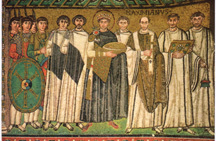
One of the ambitions of the University of Notre Dames Spirit of Notre Dame capital campaign is the establishment of an endowment for Byzantine studies within the Medieval Institute.
That ambition was quickened earlier this year when Thomas F.X. Noble, Robert M. Conway Director of the Medieval Institute, applied to the National Endowment for the Humanities (NEH) for a challenge grant supporting Byzantine studies.
Notre Dame has for more than 60 years had one of the premier programs in Medieval studies in the United States,Noble said.This NEH grant puts the University in a position to develop the premier Byzantine studies program in the nation and one of the top programs in the world.
Emphasizing Byzantiums crucial role from the 4th to the 15th centuries asa great civilization at the crossroads of interchange among Christianity, Judaism and Islam,Nobles proposal argued thatto understand the history and thought of Byzantium is to better understand the cultures and religious dynamics of those regions and religions today.
In June, the University was awarded a four-to one NEH challenge grant of $800,000, a dramatic and promising incentive to raise another $3.2 million which will make possible the addition of two faculty positions in the Medieval Institute, one in Byzantine history and another in the history of Byzantine theology; two graduate fellowships in Byzantine studies; a variety of conferences and visiting lectures in Byzantine studies; and new library acquisitions in the field.
A field often overlooked and misunderstood by contemporary academics in theWest, Byzantine studies concerns the history, culture, politics, faith and thought of the eastern half of the Roman Empire which surrounded Byzantium, the ancient Greek city
later called Constantinople and still later Istanbul.While the western half of the empire dominated by Rome disintegrated as a result of the barbarian invasions of the 5th century, the part dominated by Constantinople survived and often flourished for the next one thousand years.This Byzantine part of the empire uniquely absorbed, enriched and exported aspects of Greek, Roman, early Christian, Asian and Slavic cultures and supported a civilization in which the faiths of Christianity, Judaism and Islam all exerted profound and lasting influence.
Until recently, Western academics have generally shown little enthusiasm for Byzantine studies, evidently agreeing with the disdainful judgment of the 18th century historian Edward Gibbon, who jeered that the history of this civilization of Greek-speaking Romans was no more thana tedious tale of weakness and misery.Such contempt has so debased the wordByzantineitself that its popular and pejorative meaning is nowcomplicated to the point of incomprehensibility.
Increasing numbers of medieval scholars today, and certainly those at Notre Dame, would hotly disagree both with Gibbons dismissal and the modern misuse of the term, arguing that Byzantium is not only intrinsically fascinating, but also indispensable to an understanding of the development of Western civilization, the Slavic world and Islam.
Since its establishment in 1946, Notre Dames Medieval Institute has gained an enviable international reputation for the strength of its scholarship in the history, language, literature, philosophy, theology and art of the western Medieval world and its four great religious traditions, Latin Christianity, Orthodox Christianity, Islam and Judaism.Aside from its art and certain aspects of its language and theology, the Byzantine world of the same period has not been as well represented in the institutes scholarship.The recent challenge grant expresses the NEHs confidence that Notre Dame could soon become an international center of Byzantine Studies to rival any other in the world.
The considerable resources on which the Byzantine studies program will be able to build include the 40,000 volume library of the late Milton V. Anastos, one of the nations foremost Byzantine scholars, which Notre Dame acquired 10 years ago.Since then, Notre Dame holds the nations second largest (after Harvards) library collection dedicated to Byzantine thought, history and culture.
Moreover, the new faculty members and graduate students in the proposed Byzantine studies program will be accommodated by a congenial community of colleagues.Several of the nearly 50 faculty members in Notre Dames College of Arts and Letters now affiliated with the Medieval Institute are teaching, researching and writing on Byzantine subjects in history, art history, theology and classical languages.
Charles Barber, associate professor of art history, for instance, lectures and writes on all aspects of early Christian, Byzantine and Medieval art; Rev. Brian E. Daley, S.J., Catherine F. Huisking Professor of Theology, recently edited a critical edition of the works of the 6th century Greek theologian Leontius of Byzantium; Robin Darling Young, associate professor of theology, lectures and writes on Greek, Syriac and Armenian Eastern Christianity and early Christian monasticism; Joseph Amar, professor of classics, specializes in classical and Christian Arabic, Syriac literary culture, and early interactions among Judaism, Christianity and Islam; and Noble himself recently finished a monograph exploring the discourse of late antique and Byzantine art and its effects on western quarrels over religious art.
Father Hesburgh has always praised Medieval studies as one of Notre Dames jewels,Noble said.He has also often said that Notre Dame is where the Church does its thinking.Pope John Paul II said dozens of times that the Church must breathe through both its lungs, the Eastern one and the Western one.The NEH challenge grant gives todays Notre Dame a chance to keep faith both with Father Ted and with the late John Paul, and that is pretty good company.
So the already renowned scholarship of Notre Dames Medieval Institute is likely to become even finer, more Byzantine, in fact in the simplest, oldest, richest, and best sense of that word.
_ Contact: Thomas Noble at 574-631-6604 or_ " tnoble@nd.edu ":mailto:tnoble@nd.edu
_From:Michael O. Garvey, news and information
_
p.
TopicID: 25526